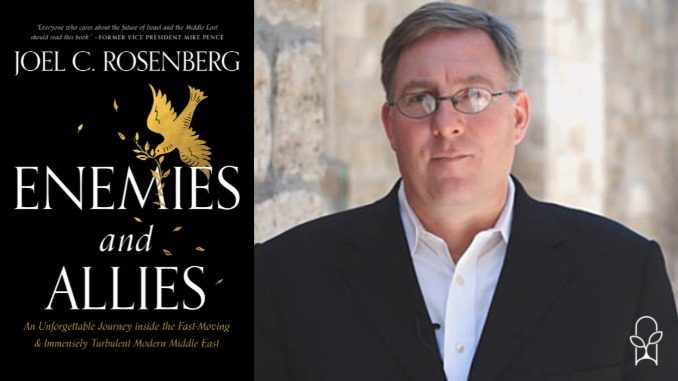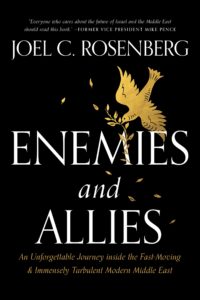
Podcast (beyond-the-page): Play in new window | Download
Subscribe: Apple Podcasts | RSS
For well over a decade now, Joel Rosenberg has had his finger on the pulse of the Middle East. His debut novel The Last Jihad opens with terrorists hijacking an airplane to fly into important buildings…and it was written prior to 9/11. Other books have also proved prescient, or at least knowledgeable of the Middle East and have slowly positioned Rosenberg as an authority in the area—not just for his fiction, but non-fiction as well. Enemies and Allies is Joel’s latest non-fiction guide to the Middle East, her nations, and her leaders. In this interview, Joel and I talk about the disastrous withdrawal from Afghanistan and what effect that may have on the region. We also focus on Saudi Arabia and its uneasy position as ally to the United States.
The Interview | Joel Rosenberg
This interview excerpt has been lightly edited for conciseness and clarity. You can listen to the full interview above or wherever you get your podcasts. Full transcripts are available upon request for media purposes.
Josh Olds: I was convinced that with everything going on, I was going to get an email or something saying, “Oh, Joel’s busy, we’re not going to be able to do the interview.” So I thank you for taking time out of what I know is a very busy schedule for you. I want to hone in on the book subtitle for a second: fast moving and immensely turbulent. When I first reached out to your publicist to request an interview over this book, Israel had a different Prime Minister and the Taliban did not control Afghanistan.
Joel Rosenbeg: Right. So yeah, that’s…there you go. Yeah, that’s my point. Exactly. If you dial back a couple of weeks to before President Biden made his abrupt decision to pull all US forces out of Afghanistan, then put even more forces back into Afghanistan…right before that, you know, I’m not sure if anyone would have paid attention to my new book, because people are tired of the Middle East.
So that’s why President Biden and his predecessor, President Trump, wanted to pull all US forces out. I disagreed with that decision. We can get into that if you want. But the point is, you know, we still have US forces in South Korea, in Japan, in Germany, decades and decades and decades after those conflicts. Why? To create stability, strengthen those governments and make sure everybody knows that, you know—don’t go backwards. And I think keeping a residual force in Afghanistan, not to do the main fighting but to strengthen our ally, was important, but both Trump and Biden wanted to pull out.
And that’s telling us something: they are trying to respond to American exhaustion by the Middle East. The problem, Josh, and I say it in the book’s preface…what happens in the Middle East affects us in America. It affects the price of gas and affects our sons and daughters going into harm’s way in the military and affects our budgets, because of trillions of dollars worth of war. Whether you’re for that or against it, or whatever, it does affect us. And the second part I say in the preface of Enemies and Allies is, even if you want to look away, turn away, forget, not pay attention to events in the Middle East, the Middle East has a way of forcing you to come back…
Biden has discovered this anew and he is now forced with this issue of how do we treat our enemies? And how do we treat our allies? Is America just turning away from the Middle East forever? It’s suddenly put the whole premise of my book onto the front page.
The Book | Enemies and Allies
 Read the full Life is Story review from LiS editor Josh Olds here.
Read the full Life is Story review from LiS editor Josh Olds here.
Do recent changes in the Middle East signal peace? One Arab country after another is signing historic, game-changing peace, trade, investment, and tourism deals with Israel. At the same time, Russia, Iran, and Turkey are forming a highly dangerous alliance that could threaten the Western powers. Meanwhile, the U.S. is drawing down its military forces in the Mideast and focusing on matters closer to home. Where’s it all heading?
New York Times bestselling author Joel C. Rosenberg, based in Jerusalem, skillfully and clearly explains the sometimes-encouraging, sometimes-violent, yet rapidly shifting landscape in Israel and the Arab/Muslim world. Enemies and Allies will take readers behind closed doors in the Middle East and introduce them to the very kings and crown princes, presidents and prime ministers who are leading the change.
Includes exclusive, never-before-published quotes, insights, and analysis from the author’s conversations with some of the most complex and controversial leaders in the world:
- Saudi Crown Prince Mohammed bin Salman (MBS)
- Egypt’s President Abdel Fattah el-Sisi
- Jordan’s King Abdullah II
- United Arab Emirates’ Crown Prince Mohammed bin Zayed (MBZ)
- Former Israeli prime minister Benjamin Netanyahu
- Israeli president Reuven Rivlin
The Author| Joel Rosenberg
 Joel C. Rosenberg (www.joelrosenberg.com) is a New York Times bestselling author of 13 novels and five nonfiction books, with nearly 5 million copies sold.
Joel C. Rosenberg (www.joelrosenberg.com) is a New York Times bestselling author of 13 novels and five nonfiction books, with nearly 5 million copies sold.
He has been interviewed on hundreds of radio and TV shows, including ABC’s Nightline, CNN, CNN Headline News, C-SPAN, Fox News, MSNBC, The History Channel, The Rush Limbaugh Show, The Sean Hannity Show, and The Glenn Beck Show. His articles and columns have been published by National Review, FoxNews.com, CNN.com, the Jerusalem Post, World magazine, and the Washington Times, among others. He has been profiled by the New York Times, the Washington Times, and the Jerusalem Post.
Joel has spoken to audiences and met with religious and government leaders all across the U.S. and Canada and around the world, including Israel, Iraq, Egypt, Jordan, Morocco, the UAE, Turkey, Afghanistan, Russia, Germany, France, Belgium, Italy, India, South Korea, and the Philippines. He has also addressed audiences at the White House and the Pentagon, addressed members of Congress on Capitol Hill, members of the Canadian Parliament in Ottawa, and a conference held at the European Union Parliament in Brussels.
He is the founder and chairman of The Joshua Fund (www.joshuafund.com), a nonprofit educational and charitable organization he and his wife launched in 2006 to mobilize Christians to “bless Israel and her neighbors in the name of Jesus, according to Genesis 12:1-3.”
